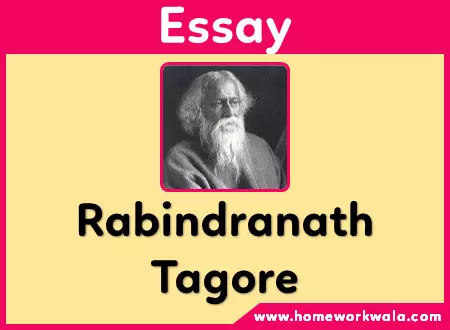Today, In this article we are going to write essay on Rabindranath Tagore in English in 600 words. This article is about Rabindranath Tagore.
This post can help the school students who are looking “Rabindranath Tagore par nibandh English mein”. We briefing about “Rabindranath Tagore in the English” which is very useful for student.
This essay on “Rabindranath Tagore” is generally useful for class 7, class 8, class 9 and 10.
[ad1]Table of Content

Simple essay on Rabindranath Tagore in English
Introduction
Rabindranath Tagore was a versatile and influential figure in Indian literature, music, and social reform during the late 19th and early 20th centuries. Born in Calcutta in 1861 to a prominent family, he developed a unique worldview that was informed by both Eastern and Western traditions. Through his prolific writing and activism, he sought to bridge the gap between different cultures and promote a vision of harmony and unity among all people. In this essay, we will explore the life and legacy of Rabindranath Tagore, focusing on his literary contributions and social activism.
[ad2]
Early Life and Education
Rabindranath Tagore was born on May 7, 1861, in Calcutta, India, to Debendranath Tagore and Sarada Devi. His father was a prominent Brahmo Samaj leader, and his mother was a devout housewife. Tagore grew up in a privileged and cultured environment, surrounded by poets, scholars, and artists. He received his early education at home and later attended University College London to study law but did not complete his studies.
[ad3]
Literary Contributions
Tagore is best known for his poetry and fiction, which are characterized by their lyrical and philosophical depth. His most famous work is the collection of poems, Gitanjali, which earned him the Nobel Prize in Literature in 1913. The poems in Gitanjali express Tagore’s spiritual and emotional experiences and convey a sense of unity with the divine and the natural world. He also wrote several plays, novels, and essays, including The Home and the World, Ghare-Baire, and The Hungry Stones, which explore themes of love, social justice, and the human condition.
Social Activism
Tagore was not just a writer but also a social activist who championed the causes of education, women’s rights, and Indian independence. He established a school called Santiniketan, which became a center of learning and cultural exchange. The school aimed to promote a holistic education that emphasized the arts, nature, and the individual’s spiritual and intellectual growth. Tagore was also a vocal advocate for women’s education and empowerment, and his plays and novels often featured strong female characters who challenged traditional gender roles.
In addition to his educational and feminist activism, Tagore was also involved in the Indian independence movement. He wrote several essays and delivered speeches in support of India’s freedom struggle and criticized British imperialism. However, he also emphasized the need for cultural and spiritual renewal and believed that India’s independence could only be achieved through a revitalization of its cultural heritage and values.
Legacy and Influence
Tagore’s contributions to literature and social activism have had a profound impact on Indian culture and society. His writings continue to be widely read and studied, and his ideas about education, feminism, and cultural revival remain relevant today. Tagore’s legacy is also evident in the numerous institutions and organizations that bear his name, such as the Rabindra Bharati University and the Tagore Society of Houston.
Conclusion
Rabindranath Tagore was a literary and social icon who transcended national and cultural boundaries. His poetry and fiction, as well as his activism, continue to inspire and influence people around the world. Tagore’s vision of a harmonious and inclusive society, based on spiritual and intellectual growth, remains relevant in today’s globalized and interconnected world. As such, Rabindranath Tagore’s life and legacy serve as a testament to the power of art and activism to shape our world.
[ad4]
You May Also Like
FAQ
Q. Who was Rabindranath Tagore?
Ans: He was a versatile and influential figure in Indian literature, music, and social reform during the late 19th and early 20th centuries.
Q. What was Tagore’s most famous work?
Ans: His most famous work is the collection of poems, Gitanjali, which earned him the Nobel Prize in Literature in 1913.
Q. What were Tagore’s social causes?
Ans: He championed the causes of education, women’s rights, and Indian independence.
Q. What was Tagore’s school Santiniketan?
Ans: It was a center of learning and cultural exchange that aimed to promote a holistic education emphasizing the arts, nature, and individuals’ spiritual and intellectual growth.
Q. What was Tagore’s vision for India’s independence?
Ans: He believed that India’s independence could only be achieved through a revitalization of its cultural heritage and values.
Q. What is Tagore’s legacy?
Ans: His contributions to literature and social activism have had a profound impact on Indian culture and society and continue to inspire and influence people around the world.
We hope you like this post about essay on Rabindranath Tagore in English. We are very glad to help the students to do their homework in an effective way. This was a “Rabindranath Tagore ka essay English mein”. This type of questions generally asked the students in their schools to write essay on Rabindranath Tagore.